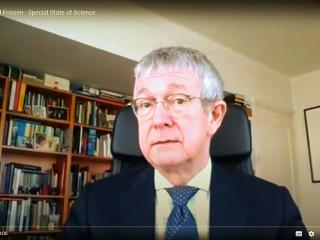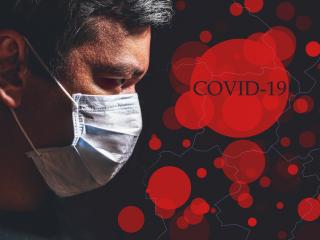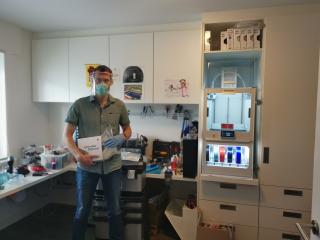Corona decision makers: include new expertise as the situation changes
Infectious outbreaks are often characterized by a lack of information and knowledge, changing and unforeseen conditions, as well as a myriad of organizations becoming involved (or not). To what extent can ex ante knowledge be made available from a network governance perspective to deal with a crisis like corona, in order to limit the transmission of a virus?
In a forthcoming publication researchers from a.o. Tilburg University suggest how the organizational network governance approach could be further developed. They introduced two outbreak scenarios, one of which dealt with a new Asian coronavirus. The publication could not have come at a more appropriate time. We interviewed organizational scientist Jörg Raab, first author of the paper Ex ante knowledge for infectious disease outbreaks .*
Is this publication known to the Outbreak Management Team (OMT)?
Jörg: “Yes, it is actually an ongoing joint research program that we have developed since 2015 on organizational responses to infectious disease outbreaks. My colleague Patrick Kenis and I were approached by Marleen Kraaij (RIVM) and Aura Timen (RIVM and member of the OMT - see photo above) about how to analyze the complex organizational network structures the RIVM experienced or foresaw in their responses to infectious disease outbreaks. Public health is not limited to the core actors of the public health system but much broader, f.e. travel organizations, airlines, schools, universities, the whole agricultural sector. This was especially the case with outbreaks of new pathogens, where there is no immediate medical cure available and therefore a speedy organizational network response is essential. The question was, how to make sure that you do not overlook important actors and how do you set up a network that engages them and secures the flow and speedy exchange of vital and reliable information from organizations within and outside the public health system.”

Why was the spread of the virus before and during carnival not recognized? Why was there such a lack of protective equipment?
Jörg Raab
Have your findings been used for the strategy pursued by OMT?
Jörg: “OMT-member Aura Timen, as country coordinator for infectious diseases, is of course very much aware of the governance challenges that our research addresses and thinks much broader than just in epidemiological terms. As a co-author she has access to our findings. For example in the corona scenario study we showed that the RIVM is both the knowledge hub and the coordination center of the network response which has its advantages but also bears the danger of information overload and becoming overburdened. The results are directly applicable at this point but only to a limited extent. Our assumption was a local outbreak that we would be able to contain. So, the results are applicable only for the first two weeks in March, in a containment phase. Once the outbreak came in a situation of community spread, the situation and the whole governance system changed. Our perspective that coping with the outbreak is not only an epidemiological but also a complex organizational and governance challenge, is still valid and essential in my view.”
Are you satisfied with the OMT-strategy?
Jörg: “What we know from theory, the overall system looked fairly good in our scenario study. The RIVM functions as a focus of trusted information for the public and political decision makers. However, in hindsight it is unclear to me, why the spread of the virus before and during carnival, especially in Brabant, was not recognized. And why was there such a lack of protective equipment, despite the fact that in 2016 a flu pandemic was listed as the second most serious security threat to the Netherlands in the national safety report, after large scale flooding, for which the Netherlands prepare much more?”
What is the answer?
Jörg: “Only some countries like Taiwan and South Korea seem to have adequately responded from the beginning. These countries were able to keep the number of infections at a relatively low level and prevent the exponential growth of the spread of the virus. They were definitely better prepared also in terms of coordinating the response from what we know now. It seems the experts in the Netherlands were surprised how infectious the virus turned out to be and that the number of serious cases was much higher than expected. One of the reasons could be that the earlier SARS epidemic was the mental map that influenced the perception. But unfortunately, it turned out that COVID-19 spread much more aggressively and under the radar than was the case with SARS, even though the mortality rate seems to be much lower. Given the threat of new viruses we should be much better prepared the next time, with a global strategy, within the E.U. as in individual countries. Why that mental map seemed to have prevailed, also in the Netherlands despite a very differentiated network, is an open question.”

What needs to be improved?
Jörg: “One: the coordination on the international and European level needs to vastly improve, and to build an institutional structure that is able to respond much better in the future. Second: the switching and layering of different coordination mechanisms and rationales. The Dutch system is relatively decentralized; that has its advantages in normal times and with localized outbreaks. However, it took quite a few weeks to switch to a more centralized crisis response mode, which is a more appropriate response in a fast moving crisis. Third: containing and coping with the outbreak, with its psychological, societal, political and economic consequences, is an enormously complex problem. The epidemiological rationale has been quite dominant but in my view that should change given that complexity.”
“Furthermore, as we move to the next phase, we should think of establishing a second expert team with virologists and public health experts but also experts from other disciplines like psychologists, historians, ethisists, economists, sociologists, and constitutional lawyers. And even scenario writers, to think more long term, make the dilemma's visible and organize a more diverse input in the decision process about the longer term developments. In the reactions to Mark Rutte's press conference on April 21, you could already see, that communicating in a predominantly epidemiological rationale will create resistance. Quite a few groups, with their economic and personal struggle, were left out of the speech and people were disappointed.”
As we move to the next phase, we should establish an expert team with also psychologists, historians, ethisists, conomists, sociologists, even scenario writers
Jörg Raab
What are the biggest problems in such a crisis, viewed from an organizational perspective?
Jörg: “Making decisions with uncertain information under enormous time pressure. Therefore, the information structure should not be fixed but also has to be adjusted to new circumstances and developments. Be open to include new people, organizations and their knowledge and expertise as the situation changes. Decision makers also have to stay open to reasoned criticism and organize that, even if it is difficult. In general, there has to be a consensus among the main decision makers on what the facts and problems are, otherwise it will be even more difficult to formulate adequate and consistent responses as we see in the United States. A discourse is necessary.”
“The current process to introduce a contact tracing app for corona infections in the Netherlands unfortunately is a negative example and it is not a surprise that it seemed to have failed for now. The longer this situation continues, the more we will be confronted with issues of value divergence. At this point, the majority of people seem to accept the dominance of (public) health values. But that will likely change once the economic, financial, and social costs increase. We have to be prepared for this situation, when different people will start to define the problem situation differently and organize a discourse where we can come to a definition of the problem situation that a majority of people supports.”
The information structure has to be adjusted to new circumstances and developments. Decision makers have to stay open to reasoned criticism and even organize that
Jörg Raab
What kind of research can we expect after this crisis?
Jörg: “The response to this outbreak will be studied for years, if not decades. Next to more macro country comparisons, it will be interesting to see what network structures evolved in response to the crisis in different countries, different sectors and over time. In addition, crises like this one function as a magnifying glass and it will also be interesting to study the response of all sorts of organizations to learn more about resilience, responsiveness and adaptability of organizations. In following up on our own research, I definitely want to replicated the study we did with the fictitious scenario in 2015/16 about the actual response in March 2020 and find out, what lead to this specific mental map and why the spread of the virus was not detected earlier.”

Organizational research developed with RIVM and PhD students
Next to this research the the RIVM Jörg Raab and Patrick Kenis also did two studies on resistant bacteria outbreaks and a conceptual study on developing a typology of outbreaks and outbreak responses. And together with a visiting scholar from the U.S. a study on social media response and communication was conducted with regard to the vaccination campaign around the Meningococcal outbreak in 2018.
In addition, Jörg Raab is currently supervising a PhD student together with professor Aura Timen, co-author and member of the OMT, on organizational responses to infectious disease threats at Ports of Entry in Europe, as part of a large EU project. The Department of Organization Studies also trained RIVM PhDs in network analysis at Tilburg University and Tilburg University students did internships in combination with their thesis at the RIVM. See f.e. the article by Jacklien Maessen MSc on the resistant bacteria outbreak in PLOS One (July 2019).
Note:
* Jörg Raab, Patrick Kenis, Marleen Kraaij–Dirkzwager & Aura Timen: Ex ante knowledge for infectious disease outbreaks, Introducing the organizational network governance approach. Affiliations of the authors: Dr. Jörg Raab: Tilburg U, Dept. of Organization Studies, TSB; Prof. dr. Patrick Kenis: Tilburg U, Department of Public Governance, TISEM; Marleen Kraaij-Dirkzwager: Intituut Fysieke Veiligheid; Prof. dr. Aura Timen: National Coordination Centre for Communicable Disease Control, National Institute for Public Health and the Environment (RIVM)/Athena Institute, Free U Amsterdam. The article will soon appear in: J. Glückler, G. Herrigel, & M. Handke (Eds.), Knowledge for Governance, Springer series Knowledge & Space, vol. 15, 1 May 2020.
The 'New Common'
The corona crisis has compounded major societal challenges. Tilburg University shares knowledge and insights to reshape our society. We are happy to discuss this New Common.
Date of publication: 30 April 2020




